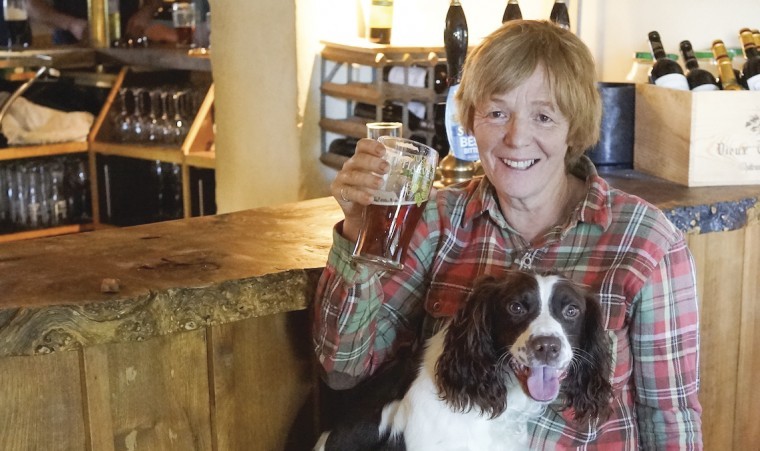“Living the dream?” an urban colleague enjoyed saying to me. He’d visited the farm on a sunny day and was convinced that farmers live in a Utopian world. It’s interesting to consider how the urban population view those of us who earn a living from the land. Dreams aren’t always good are they? In fact sometimes they can be pretty scary and it’s a relief to wake up. I wish falling farm incomes were just a bad dream and not the reality that they are right now.
What an inspirational idea Open Farm Sunday is. Farmers brave enough to do it have my full admiration. I wanted to see the open day concept in operation and so visited an organic dairy farm. People were shoaling in, including many young families. The weather was beautiful, young farmers helped with car parking, the dairy herd grazed close by. There were stalls selling local produce, a nature trail, sheep shearing demonstration, tractor trailer rides and home grown meat was on offer straight from the barbecue. I know it’s a lot of hard work to organise but the result was impressive. Educating our customers in this way must help the fight for farmers survival.
The South Sheep event was a good excuse to abandon care of the farm to The Boy and make the trip to Wiltshire. Beautiful countryside: there are some huge fields growing fine crops of corn. I admit to feeling a little envious! The day whizzed by all too quickly, very informative discussions with like minded people and fascinating facts gleaned.
I admire the New Zealanders ability to think outside the box. How do you fancy eating wool? I learned that the Kiwis are funding research at Otago University into the extraction of food safe digestible protein from natural wool. This is 95% protein, with no fat or carbohydrate and has a positive effect on blood sugar and cholesterol. Perhaps our British Wool Marketing Board could learn a trick or two on how to boost the price of wool from these guys. Mind you the only wool I’ve ever seen eaten, is by over exuberant sheepdogs, not mine of course!
I also enjoyed watching the sheepdog trials, observing the interactions between dog, handler and sheep. I’d be happy to see more trials held in the south. The farm tours around the estate were popular. Farmers face similar problems and it’s interesting seeing and hearing about the different ways these are tackled. With our milder wetter winters, I wonder if more of us will be forced to house sheep? They’d tried winter shearing for the first time and discussed the pro’s; easier to see condition; not getting cast, and cons; more mastitis etc. They’d also established a crop of Avalon stubble turnips. This has a good ability to regenerate, it’s a bushy plant providing better weed control, nine to 10% dry matter and 18 -19% protein and is used for finishing lambs. We might give this a try.
Sir Peter Kendall and Owen Paterson debating the referendum was entertaining. Let’s hope the people’s decision is best for our country. In my opinion more honesty and kindness would be good. Enough talking, more action, less European Union interference, allowing farmers to do their job, feeding the nation. Whatever the politicians and supermarkets get up to, farmers will no doubt continue attempting to make a living the best way they can.
I’d say most farmers would agree that our business doesn’t always run as smoothly as we’d like. Even the best laid plans can go astray! It’s not surprising that farmers become stressed. Right now, the weather is so changeable it’s not helping silaging, and hay making is impossible. There’s certainly room for better cash flow! But with the present political upheaval who knows what will happen financially. We frequently hear of horror stories involving bureaucrats caused by lack of understanding about the practicalities of farming. There’s not enough hours in the day to get through our workload.
However I was alarmed when I read the statistics that “one in four will have a mental health problem.” Signs of stress can include eating more or less than normal, mood swings, being unable to concentrate, feeling tense, useless, worried, nervous, being tired and forgetful or not sleeping well. This can also lead to problems of anxiety, depression and physical symptoms such as: indigestion, irritable bowel syndrome, tension headaches, and back pain. Now I’m worried! (I was stressed myself when tired after an evening out and I completely forgot to shut the chickens up: 5am in the morning I remembered! Luckily I got away with it.) Constant stress is unhealthy. Farmers need to take care of themselves, for their own good as well as their farm.
The NHS advocates five actions for improving mental wellbeing. 1) Socialise, cultivating friendships. 2) Exercising which encourages the body to release endorphins, a feel good factor. 3) Continue learning, take time to learn a different skill. 4) Give help, take time to help other people. 5) Improve mindfulness, appreciate our surroundings.
The farming lifestyle makes it difficult to create a life work balance. Generally farmers are resilient and stoical, they’re used to isolation and hard work, but pressures can get you down. Farm Community Network provides confidential help for farmers on 03000 111 999 or www.fcn.org.uk Please don’t brush things under the carpet, it helps to talk when the going is tough.
On a lighter note, together with a friend, I’ve been learning the art of ringing the bells. We’ve recently been upgraded, joining the other practicing bellringers. My youngest daughter questioned incredulously: “How difficult can it be to pull on a rope?” I answered defensively: “More difficult than you might think.” Isn’t that so true about many things in life.




